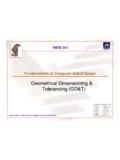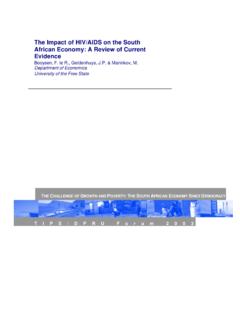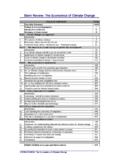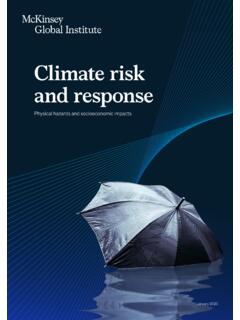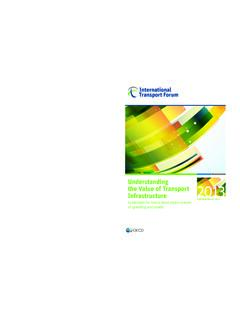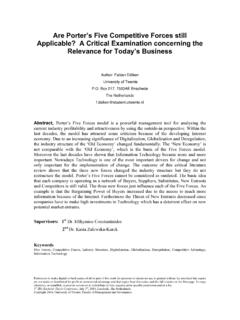Transcription of III – The economic impact of the Olympic Games
1 IntroductionThe Olympic Games is an event of suchmagnitude that it can potentially have asignificant economic impact on the host cityand, for the smaller countries, on the hostnation as a whole. While the actual eventmay last for only a few weeks, preparationscommence up to a decade beforehand andmay entail considerable investmentexpenditures that can have longer termeconomic significance. With the Athens2004 Olympics only weeks away, this articleidentifies the economic effects of hosting theGames, reviews the experience of past hostcities, and reviews the outlook for the Greekeconomy in the light of the likely impact ofthe Athens Games . The discussion isstructured as Identifying the economic impacts of theOlympic Evidence from past The Athens 2004 Olympics and theoutlook for the Greek Summary and conclusionsIn Box , at the end of this article, we alsotake a look at how far economic and politicalfactors can contribute to explaining howmany medals countries win at the Identifying theeconomic impacts of theOlympic GamesIt is important to draw a distinction betweenthe financial impact of hosting the Olympicsand the wider economic impact of the financial impact of the Games relatesspecifically to the budgetary balance of thehost city s organising committee, and whetherthe financial costs of hosting the Games canbe met by the revenues directly generatedfrom Games events.
2 The economic impact , onthe other hand, relates to the wider effects ofthe Games on the general economy arisingfrom associated factors such as increasedtourism and improved infrastructure. Ingeneral, we focus in this article on the overalleconomic impact , although in some cases wealso refer to estimates of the financialperformance of the Games , for large economies such as theUnited States, the economic impact of hostingthe Games is likely to be significant primarilyat the local or regional level, rather than at themacroeconomic level. But for a smallereconomy such as Greece, these effects arelikely to be felt also at the national full economic impact of the OlympicGames on a host city is spread over time, andcan broadly be split into three phases: Pre- Games impact Impacts first start tooccur soon after the city has decided tobid for the Games , up to a decade priorto the actual event, but become moresignificant after the Games is impacts here relate mainly to theinvestment and other preparatoryactivities required to stage the Games ,but tourism could also start to pick up inadvance in some cases due to the higherprofile of the host city.
3 Games impact The impact of theGames and the associated eventsimmediately surrounding them. Post- Games impact The longer-termimpact, often referred to as the Olympic legacy , can last for at least a decade after the Games . This mainlyrelates to post- Olympic tourism andinfrastructure main economic benefits and costsassociated with the Games are summarised in Table and discussed further benefitsLooking at the direct effects of hosting theOlympic Games , tourism is the only activitywhose impact may be felt in all three of theabove phases. The Olympic Games providea unique event that attracts visitors both fromwithin the host country and around theglobe. Visitors directly linked to the Gamesinclude participants (athletes, coaches, teamofficials), spectators, sponsors and themedia. Moreover, the promotion of the citycreates an induced tourism effect as furthervisitors are attracted by the city s additionalmedia exposure and enhanced internationalreputation.
4 While the number of additionalvisitors reaches a peak during the year of theGames, this latter effect can sustainincreased tourism flows for several yearsafter the The economic impact of the Olympic Games benefits CostsPre- Games Phase Tourism Investment expenditure Construction activity Preparatory operational costs (including bid costs) Lost benefits from displaced projectsGames phase Tourism Operational expenditure Stadium & infrastructure associated with Games Olympic jobs Congestion Revenues from Games Lost benefits from displaced (tickets, TV rights, projects sponsorship, etc.) Post- Games phase Tourism Maintenance of stadiums Stadiums & infrastructure and infrastructure Human capital Lost benefits from displaced Urban regeneration projects International Reputation Table Key economic benefits and costs of the Games18 PricewaterhouseCoopers European economic Outlook June 2004 Additional tourists bring additional demandto the regional (and national) economy asvisitors spend money on purchasing food,accommodation, transport and tickets for theGames themselves.
5 Broadcast revenues andcorporate sponsorship may also accrue inpart to the host city, although the IOC willgenerally also take a significant share of theserevenues. Moreover, there is an additionalsecondary effect as the new money is re-spent within the borders of the host economy(although the effects here will differ at local,regional and national level). This multipliereffect includes additional Games -relatedemployment and purchasing by localcompanies, as well as the impact of everydayhousehold spending by employees of thecompanies benefiting from increased should be stressed that it is the net economicimpact that is of importance here; only moneythat would not otherwise have been spent isrelevant. Some tourists would have visited thecity even without the Games , while some whowould otherwise have visited the city mayhave gone elsewhere for their holiday so as toavoid the large crowds attracted to the event(this is, for example, a concern in relation toLondon, a possible host for the 2012 Games ,given the pressures that already exist on theCity s transport infrastructure in particular).
6 Indeed, the additional congestion during the Games period could also induce some city residents to leave the region to take aholiday elsewhere benefits (legacy effects)Whilst the financing of construction projectsmay be costly, the host city should alsobenefit in the longer term from the additionalinfrastructure. Productivity should be raised,for example, by the improved transportfacilities for handling passengers and creation or enhancement of sportsfacilities also increases the city s ability tohost other major national and/or internationalsporting events, provides opportunities forresidents to participate and can generallymake the city a more attractive place to may also help to regenerate rundown the positive impact from some of thesedevelopments may be difficult to measure ineconomic terms, they are, potentially, animportant legacy of the of the other legacy effects of the Gamesare also hard to quantify statistically.
7 Forinstance, Olympic -related business contractsmay help create longer-term businesspartnerships. The extensive media exposureduring the Games may enhance thereputation of the city as an attractive businesscentre, further attracting new investment andtrade from global companies. Preparations forthe Games may also raise the city s stock ofhuman capital as employees are givenadditional training in areas such astelecommunications and costs of the GamesWhile additional consumer demandsurrounding the Games is the mostimmediate source of benefit to the local (andnational) economy, the most obvious cost ofhosting the Games relates to the operatingcosts of hosting the event, as well as theconstruction of the necessary Olympicsinfrastructure, such as the Olympic village,stadia, media centre and transport high level of Games -related expenditureon construction creates a huge demand in thesector, which may also displace otherinvestment projects 2.
8 Rents could also beaffected indirectly if housing construction isdisplaced by other building projects. A citysuch as Athens, for example, may find suchcosts greater and more difficult to managedue to the need for more extensiveinvestment in infrastructure. These citieswould also be more likely to experience theadverse effects of crowding out and priceincreases due to resource scarcity in certainsectors in the years before the costs and additionalityIn addition to weighing up theaforementioned costs and benefits of hostingthe Olympics, it should also be askedwhether alternative uses of public fundsmight generate greater benefits for the if the economic benefits from hostingthe Olympics exceed the financial costs, it ispossible that public money spent on otherprojects would have yielded a higher netreturn. This is the so-called opportunity cost :the benefit of the best alternative project(s).
9 In standard economic appraisals, this cost isreflected in the discount rate used tocalculate the net present value (NPV) of costsand benefits , but it may also be that, givenlimits on the availability of public funds, theremay be a range of alternative projects withpositive NPVs between which governmentsneed to choose in determining the best use of government funds. On the other hand, it is also possible that theGames may act as a catalyst to importantinfrastructure projects that would otherwiseremain on the drawing board for severalyears or not proceed at all ( there could beso-called additionality benefits , althoughthese will be less significant if it is just amatter of affecting the timing of projects). Of course, it cannot necessarily be assumedthat the Olympics will generate worthwhileinvestments, rather than leaving so-called white elephants with little lasting value tothe economy.
10 Success here requires Olympicinvestments to be fully integrated into a long-term vision for development of the host city(as was, for example, the case withBarcelona, as discussed further below). Evidence from past GamesFinancing the OlympicsThe macroeconomic effect of hosting theOlympic Games received little seriousattention prior to the first economic impactstudy conducted for the Los Angeles Games of1984. Interest in the wider economic effects ofhosting the Olympics developed after the cityof Montreal declared a considerable financialdeficit from the 1976 Games (see Table ,although it should be noted that this refers onlyto the direct financial effects of the Games , nottheir overall economic impact ). The MontrealOlympics were financed almost entirely withthe city s own public funds, with aconsiderable amount spent on improvinginfrastructure and sports facilities in a relativelysmall area of the city.
